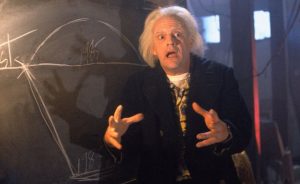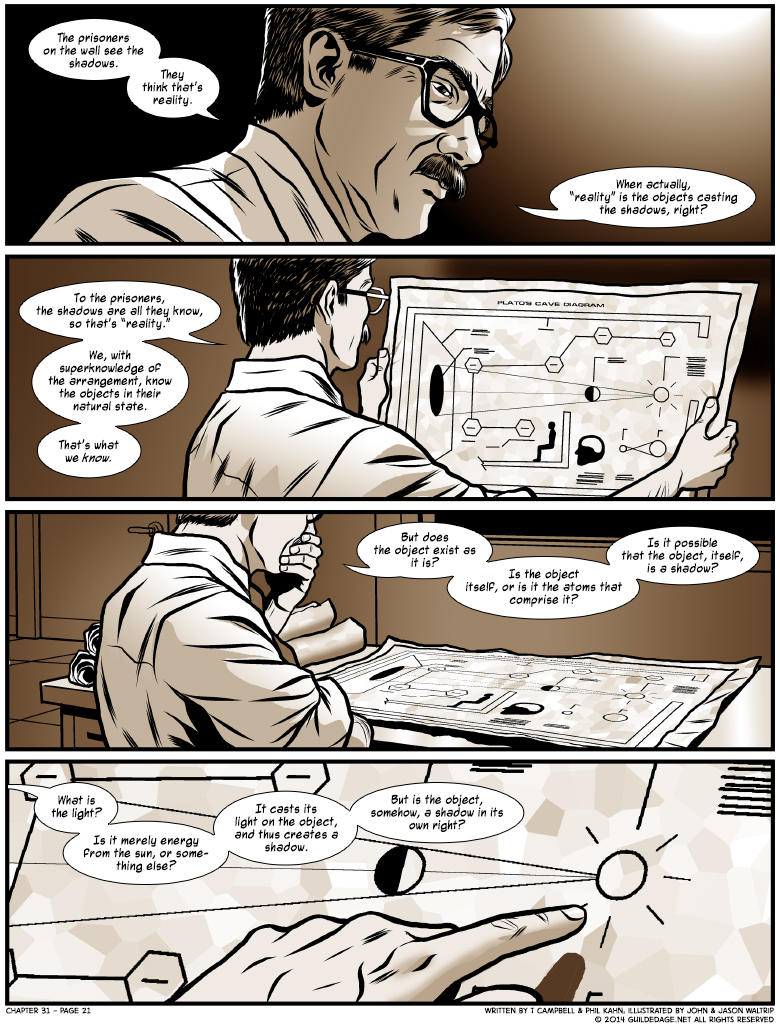Annotated 31-21
 I don’t have many non-redundant things to say about the philosophical sculpture that HR is glassblowing over this and the next couple of updates. It does remind me of the way some meta-comics like to toy with the idea that everybody’s reality is some higher reality’s fiction, perhaps in an infinite chain or perhaps finally terminating in the ultimate Creator.
I don’t have many non-redundant things to say about the philosophical sculpture that HR is glassblowing over this and the next couple of updates. It does remind me of the way some meta-comics like to toy with the idea that everybody’s reality is some higher reality’s fiction, perhaps in an infinite chain or perhaps finally terminating in the ultimate Creator.
Just as well we scrapped the idea of Wordsworth and Mongo (fictional “creators” of the comic strip “Guilded Age”), otherwise they probably would’ve shown up at the end, here. And they probably would’ve been smoking weed.
It is interesting to me that we finished the first scene by saying that in Plato’s example, any enlightened cave-dweller would be put to death for trying to enlighten someone else. And yet here HR is, trying to do exactly that. Admittedly, he will only do this with Carol. A sign of the value he put on their relationship almost from the start? A gnawing need to tell somebody? Or just another way he regards himself as above the rules?











Now that you mention it, that does sound kind of weedy.
Good choice to not underscore that while breaking simulated fourth walls.
OTOH, Plato was definitely wrong about a lot of things, and his “They’d fo sho kill ya” bit does seem more like a “Republicans are basically like victims of the holocaust” than as any kind of actually convincing conclusion.
Since then, we’ve been told many times by many kinds of people that we’re living in caves.
And yet the Naïve Realists have yet to kill those who point out that realism requires a leap of faith.
One such cave is the Phaneron.
When Kant admitted that we can’t access the Ding Am Sich, was he murdered?
No.
More the pity, he was an unapologetic race theorist, and his work is and was massively overrated.
Other thing Plato was wrong about, which seems obvious now but admittedly took us a couple of thousand years to see through, is Justified True Belief, which defined Knowledge in a completely circular and obscure way, which made us less able to think clearly for a very very long time.
To me, it’s kind of obvious that the ancient greek philosophers were wrong about tons of stuff. I wonder how come that so many people still believe that they know more “about the world” than is known today. That must be some hold-over from the dark ages, at which time that was actually true. You could learn more about a lot of things by (finding and) studying ancient philosophical texts than by going out and doing the research yourself. But that’s long past.
At the same time, I find it unfair to use that fact to make them look less capable than they were. Regarding the circumstances and the society they lived in, they were incredibly smart people, and incredibly rational.
That thing about getting murdered for telling others about the truth, though: I’d think that that is a statement about the society which Plato knew, and about a frequent reaction to somebody trying to spread information which questions everybody else’s world view — and we’re is still not a point where such things are embraced. See Climate change, and the way whistleblowers still being more likely to be punished than whatever they blew the whistle on to be dealt with. So there *is* some fundamental human trait which Plato was correct about. (and which, seriously, we should deal with rather sooner than later, or else…)
As I’ve learned through experience, having respect for your elders tends to place them in higher regard than necessarily deserved. In the realm of academics, to which the ancient greek philosophers most people know about belonged, this is no less valid. Sure, they were the wise guys of their day (whose histories were actually recoverable), according to what we know of them – but wisdom is relative to both your knowledge and your circumstances.
Considering how in the dark even modern humans are about the nature of the world, and about themselves, the fact that we act from a place of relative naivety about everything from what’s in our food to who other people seem to be (including our neighbors) should give us pause. Many ancient peoples had better insight into the elements of the world that most closely surrounded them, for lack of alternative experience, relatively speaking.
I suspect, rather than being a holdover from the dark ages, or a relic of misplaced respect, popular admiration for some old dead guys is more of a result of misguided envy for those who lived in more well-charted times.
Hindsight is as close to 20/20 as your spectacles allow, after all.
tbf, the day is still young! HR may yet be put to death
A shadow of a shadow…. ok yeah, that definitely messes that formula up big time
“Paging Doctor Occam! Doctor Occam to H.R’s office please?”
For heaven’s sake, Doctor, get a shave!
Did HR ever have any idea what he’d done, when he (to hear certain elves tell it, down the line) cloned an unseen Arkerra to create the one The Five entered?
Taking what he said to Carol at face value, it appeared no. It appeared he expected arcanometrics to function as a kind of black box/chinese room for the game’s code, that takes in player input (and admin overrides/instructions) and spits the same values (text strings for character dialogue, your PC’s current location and inventory) that a normal game would produce via mundane coding methods. The Bough of Graia aftermath would appear to be the point where he first voiced the suspicion that the “simulation” arcanometrics was running might have some kind of life of its own.
He’s a rich white guy in America. What can’t he say?